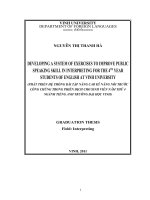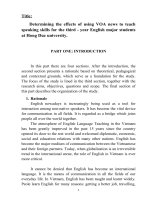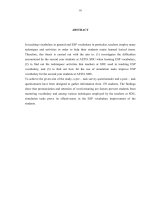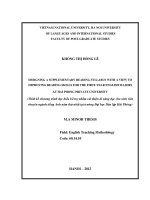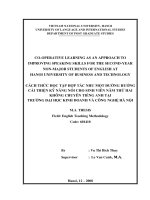recommendations to improve speaking skills for the fourth year students of english
Bạn đang xem bản rút gọn của tài liệu. Xem và tải ngay bản đầy đủ của tài liệu tại đây (361.42 KB, 56 trang )
HANOI OPEN UNIVERSITY
FACULTY OF ENGLISH
GRADUATION THESIS
B.A DEGREE IN ENGLISH STUDIES
RECOMMENDATIONS TO IMPROVE
SPEAKING SKILLS FOR THE FOURTH YEAR
STUDENTS OF ENGLISH
Supervisor : Nguyễn Thanh Bình, M.A
Student : Phạm Ngọc Phương
Date of birth : 11/07/1991
Course : K16A12 (2009 – 2013)
Recommendations to improve speaking skills for the 4
th
year students
Hanoi - 2013
Phạm Ngọc Phương - K16 A12
Recommendations to improve speaking skills for the 4
th
year students
DECLARATION
Title: Recommendations to improve speaking skills in English for the
4
th
students of English.
(Graduation Paper submitted in Partial Fulfillment for B.A Degree in
English).
I certify that no part of the above report has been copied or reproduced
by me from any other person's work without acknowledgement and that report
is originally written by me under the strict guidance of my supervisor.
Date submitted: April 26
th
,2013
Student
(signature)
Phạm Ngọc Phương
Supervisor
(Signature)
Nguyễn Thanh Bình,M.A
Phạm Ngọc Phương - K16 A12
Recommendations to improve speaking skills for the 4
th
year students
ACKNOWLEDGEMENTS
At this stage of research accomplishment, I would like here by to extend
my profound gratitude to my supervisor Mrs. Nguyen Thanh Binh M.A from
whom I have received enormous kindness and guidance.
Also, I am very grateful to all the teachers at the English Faculty of
Hanoi Open University for their interesting and useful lectures which have
built in me a firm foundation with immense ideas for the fulfillment of this
paper.
In particular, my special thanks go to my parents who have, as it always
goes, encouraged and supported me so much in all respects.
Last but not least, I should also express many thanks to my dear friends
who have shared with me a lot during my studies and my research work as
well.
Hanoi, April 26
th
,2013
Phạm Ngọc Phương
Phạm Ngọc Phương - K16 A12
Recommendations to improve speaking skills for the 4
th
year students
TABLE OF CONTENTS
Recommendations to improve speaking skills for the fourth-year students at
Faculty of English (FOE), Hanoi Open University (HOU).
DECLARATION 3
ACKNOWLEDGEMENTS 4
TABLE OF CONTENTS 5
PART A: INTRODUCTION 1
1. Rationale 1
2. Aims of the study 1
3. Scope of the study 2
4. Research questions 2
5. Methods of the study 2
6. Design of the study 2
PART B: DEVELOPMENT 4
CHAPTER I: LITERATURE REVIEW 4
1.1 Definitions of speaking 4
1.2 Speaking English as a skill 5
1.3 Importance of speaking 5
1.3.1 The role of speaking inside and outside class 6
1.3.2 The relationship between speaking and other skills 6
1.4 Types of speaking skills 7
1.4.1 Interactive 8
1.4.2 Partially interactive 8
1.4.3 Non-interactive 8
Phạm Ngọc Phương - K16 A12
Recommendations to improve speaking skills for the 4
th
year students
1.5 Process of speaking 8
1.5.1 Breathing stage 9
1.5.2 Phonation stage 9
1.5.3 Resonation stage 9
Total renovation 10
1.5.4 Articulation stage 10
1.6 Factors affect the process of speaking 10
1.6.1 Grammar accuracy 11
1.6.2 Fluency 11
1.6.3 Pronunciation 11
1.6.4 Vocabulary 12
1.7 Summary 12
CHAPTER II: PROBLEMS ENCOUNTERED BY THE FOURTH-
YEAR STUDENTS OF ENGLISH IN LEARNING SPEAKING
SKILLS 14
2.1 Data collection 14
QUESTION 18
ANSWER 18
A 18
B 18
C 18
D 18
11 18
16 18
15 18
22 18
Phạm Ngọc Phương - K16 A12
Recommendations to improve speaking skills for the 4
th
year students
7 18
12 18
12 18
13 18
32 18
3 18
13 18
15 18
16 18
7 18
22 18
14 18
15 18
23 18
19 18
3 18
15 18
23 18
13 18
6 18
18 18
2.3 The problems and limitations of the fourth-year students in Speaking English 19
2.3.1 The lack of vocabulary 19
2.3.2 The confusion of pronouncing and using grammar 19
2.3.3 The lack of self-confidence 20
2.3.4 The lack of background knowledge and culture 21
Phạm Ngọc Phương - K16 A12
Recommendations to improve speaking skills for the 4
th
year students
2.4 Summary 22
CHAPTER III: SUGGESTIONS TO IMPROVE SPEAKING SKILLS
23
3.1 Background knowledge 23
3.2 Developing English style 23
3.2.1 Good eye contact 23
3.2.2 Positive face-saving strategies 25
3.2.3 Good personal appearance 26
3.3 Improving self-confidence 26
3.3.1 Joining the English - speaking clubs 27
3.3.2 Speaking to native people 27
3.3.3. Well preparing for the topic 27
3.4 Group work 28
3.4.1.Working in pairs 28
3.4.2.Working in groups 28
3.5 Warm-up activities in speaking 31
3.5.3 Telling stories 32
3.5.4 Playing games 32
3.5.5 Word games 32
3.7 Individual work 34
3.7.1 Improving grammar 34
3.7.2 Improving pronunciation 34
3.7.3 Vocabulary enlargement 35
3.7.4 Improving speaking through reading 36
3.7.5 Improving speaking through listening 36
3.8 Self-consciousness of improving the speaking skills 37
Phạm Ngọc Phương - K16 A12
Recommendations to improve speaking skills for the 4
th
year students
3.10 Summary of the chapter 39
PART C: CONCLUSION 40
APPENDIX 1
SURVEY QUESTIONNAIRE 1
Phạm Ngọc Phương - K16 A12
Recommendations to improve speaking skills for the 4
th
year students
PART A: INTRODUCTION
1. Rationale
Language is the tool of communication, while speaking is the most
important part of language communication and it is the basic path to understand
others. Listening is the activity of paying attention to and trying to get meaning
from something we hear. To speak successfully to spoken language, we need to
be able to work out what speakers mean when they use particular words in
particular ways on particular occasions and not simply to understand the words
themselves. Many students of English in Vietnam in general and ones at Faculty
of English, HOU in particular do badly in this field, they find it difficult to get
good marks in English speaking comprehension, especially in understanding the
implied meaning of conversation.
When learning English, people have to learn four skills: listening,
speaking, reading and writing. Among those, speaking skills are particularly
important. They are used the most regularly because speaking skills and human
being cannot be separated from each other. People use speaking skills to express
their ideas and to communicate.
However, speaking skills require a long process of practicing and are
affected by many factors. How to enhance English speaking skills promptly and
effectively is a hard question for any Vietnamese learners, especially for the
students of Faculty of English at Hanoi Open University. Most students still
find it difficult to be a good speaker. The problem is: the students are lack of
vocabulary, self-confidence and the background knowledge of culture.
As a senior students who has some experience in learning English, T
choose this study to help learners improve their English speaking ability
naturally.
2. Aims of the study
The purpose of this study is to improve the speaking skills for the fourth
year student at Faculty of English - Hanoi Open University. As a result, the
Phạm Ngọc Phương - K16 A12
1
Recommendations to improve speaking skills for the 4
th
year students
main aims of this thesis are:
-Giving a brief overview of the previous materials relating to speaking
skills.
- Raising some problems encountered by the fourth-year students English
when practice speaking.
- Proposing recommendations for developing the skills.
3. Scope of the study
Due to time limitation and the length of the paper, I would like to focus
on speaking skills, the common errors and make a few suggestions to solve
problem on speaking skills. This is why I have chosen recommendations to
improve speaking skills fourth-year students of English at Hanoi Open
University as the subject for the graduation paper.
4. Research questions
These objective could be summarized into some research questions as
follows:
• What is the speaking?
• What are the problems of the fourth-year students in speaking English?
• What have the fourth-year students done to improve speaking skills in
English?
5. Methods of the study
At the study involves in finding out problems faced by the fourth-year
students of English and to aid them develop speaking skills, the data collection
mainly focuses on:
Survey questionnaire.
Classroom observations.
Then the data will be synthesized and analyzed to help find out students’
problems and the tips for improving their weakness.
6. Design of the study
The graduation paper is divided into three parts and three chapters.
Phạm Ngọc Phương - K16 A12
2
Recommendations to improve speaking skills for the 4
th
year students
Part A: Introduction
This part includes rational, aims, scope, research questions, methods and design
of the study.
Part B: Development
This part contains three main parts:
Chapter I : Literature review
Chapter II : Problems encountered by the fourth-year students of
English in speaking English.
Chapter III : Suggestions to improve English speaking skills for
the fourth-year students.
Part C: Conclusion
This final part is to summarize or restate main points of the graduation paper.
Phạm Ngọc Phương - K16 A12
3
Recommendations to improve speaking skills for the 4
th
year students
PART B: DEVELOPMENT
CHAPTER I: LITERATURE REVIEW
Speaking play a very important role daily life and communication to
others. People speak to each other " to exchange ideas and to make others see
what they mean ". In learning English, speaking is not only one important skill
but also used most regularly inside and outside class in order to learn, chat or
convey ideas to others. Thus, speaking is worth learning and practicing in a
routine. But what is speaking? The part below will provide various definitions
about speaking.
1.1 Definitions of speaking
The most common features of speaking have been shown in this simple
definition: the articulating sounds conveying thoughts, opinions. All of these are
used by speakers in every communication, which creates understanding between
speakers and listeners.
According to Merrian, the author of the book "Webster online dictionary"
(2002):
"Speaking is uttering words or articulating sounds with the ordinary
voice. Speaking is the way to convey thoughts, opinions, and emotion orally or
to express oneself".
In other words, we genuinely hope to achieve a particular end through
communicating speaking. People talk and interact to express their ideas, wishes,
or desires. By communication, they may negotiate to solve a particular problem;
or establish and maintain social relationships, friendships so on
Obviously, speaking is an important skill by which the speaker and
listener can exchange ideas, express themselves and it is impossible to
participate in any part of the speaking process without implying the existence
and functioning of its other parts.
Phạm Ngọc Phương - K16 A12
4
Recommendations to improve speaking skills for the 4
th
year students
1.2 Speaking English as a skill
By gates, in his book also assumed that:
"Speaking is in many ways as undervalued skill. Perhaps this is because
we can almost all speak, and so take the skill for too much granted. However
speaking is a skill that deserves attention every bit as much as literary skill, in
both first and second languages". (1991, p.19).
Some people think that speaking is a very simple skill. He or she may
know grammar rules well, have a large vocabulary, and then he can speak
English fluently and smoothly without practicing much. This is an extremely
wrong idea.
Looking on the surface, speaking seems to be simple; however, as being
seriously considered, it becomes a complex skill that requires some factors: how
to use grammar and vocabulary properly while speaking, how to give right
response to each communication, how to get others' interest when you talk and
so on.
In other situations, when one has oral communication with a stranger,
speaking is the only skill that helps him to show the stranger his language
competence rather than other skills. For those reasons, everyday practice and
severe consideration of speaking should be done so that the fourth-year ones can
be effective speakers.
1.3 Importance of speaking
When considering why is communication important, the bottom line is: if
you’re a good communicator, you’ll have better chances of success. You’re able
to persuade people, influence others, negotiate effectively and provide valuable feedback.
You can inspire, motivate and encourage your staff and employees. You can convey your
ideas better to your boss, you can make interesting conversation and network easier and
you can speak to groups of people with self-confidence and credibility. The better
your communication skills, the greater success you can achieve. The importance of
Phạm Ngọc Phương - K16 A12
5
Recommendations to improve speaking skills for the 4
th
year students
communication skills cannot be understated.
Communication is truly achieved when the sender and the receiver share
an understanding of the communicated message. Many times, this is easier said
than done.
Communication has two parts. The first is the communicator and how
effectively she can convey her message to the listener. The second is how well
the listener of the communication receives the message. There should be little or
no misunderstanding, misinterpretation or confusion – if there is, the
communication is not successful.
1.3.1 The role of speaking inside and outside class
As a student of English foreign language, we have opportunities to
approach English as a main subject. Students communicate or discuss about a
certain topic to get information, knowledge or simply to get good marks in
examinations by practicing in class. But the most important role of speaking
class is to give students chances to talk, practice and develop their critical
thinking, then progress their language skills. Finally, they can confidently
communicate in public and get effective speaking outside the class.
On the other hand, speaking outside class, such as practicing speaking at
home or talking to foreigners, also helps communicate inside class more easily.
These two activities have its roles to supplement to each other. Thus, students
should pay attention to combining them all the time.
1.3.2 The relationship between speaking and other skills.
In learning English, speaking and other skills are inseparable and tightly
interconnected together to create successful communication. When speaking
regularly, speaker can consolidate his grammar, remember words, structures
more clearly, or enlarge his vocabulary by brainstorming to get ideas or noting
the words he doesn't know, and then look up in a dictionary.
Phạm Ngọc Phương - K16 A12
6
Recommendations to improve speaking skills for the 4
th
year students
According to Raymond Zeuschner:
"There is a direct relationships between speaking and writing. You first
listened, then thought, then spoke and then wrote" (1997, p.86).
When one regularly does writing, it will give him an interesting ideas
then support his speaking. If simple sentences as well as complex ones in
writing are used regularly in speaking, this will much help speakers arrange
ideas and express their opinion. "Being skilled at one can help you to be skilled
at the other".
Unlike the productive skills like reading and writing, speaking is a
receptive skill. In the learning of speaking, one can enrich his vocabulary and
improve the fluency as well as accuracy in spelling, intonation for speaking.
When reading aloud, the response to English words and the skill of guessing
new words are bettered. Then students can apply new words in their speaking.
Similarly, when listening, we hear sounds, pay attention to them,
remember them, and finally imitate them. It is the same case in linguistics. In
fact, we cannot speak well if we cannot listen well and vice versa, we cannot
hear clearly if others pronounce badly. Thus, speaking and listening must be
practiced together in some ways, maybe by repeating what you have just
listened or try to express the main ideas of the recording in your own words and
thinking.
In conclusion, speaking and three other macro English skills are closely
attached to one another. Therefore, to master one skill, for instance speaking
skills, learners should combine it with the other skills to be able to approach the
high level of language.
1.4 Types of speaking skills
Speaking is the productive skill in the cral mode. It, like the other skills,
is more complicated than it seems at first and involves more than just
pronouncing words.
Phạm Ngọc Phương - K16 A12
7
Recommendations to improve speaking skills for the 4
th
year students
There are three kinds of speaking situations in which we find ourselves.
1.4.1 Interactive
Interactive speaking situations include face to face conversations and
telephone calls, in which we are alternately listening and speaking, and in which
we have a chance to ask for clarification, repetition, or slower speech from our
conversation partner.
1.4.2 Partially interactive
Some speaking situations are partially interactive, such as when giving a
speech to a live audience, where the contention is that the audience does not
interrupt the speech. The speaker nevertheless can see the audience and judge
from the expressions on their faces and body language whether or not he or she
is being understood.
1.4.3 Non-interactive
Some few speaking situations may be totally non-interactive, such as
when recording a speech for a radio broadcast.
1.5 Process of speaking
The speaking process includes activities that occur prior to during, and
after the actual speaking event. For example, before speaking, the speaker might
determine the actual content of the message, how it should be presented, and
what kind of audience will be hearing the message. While speaking, the speaker
must attend to such things as presenting a clear message, tone of voice, suitable
vocabulary, possible response, the environment, and non-verbal gestures.
Following speaking, the speaker might accept comments, answer questions,
explain concepts not understood, and assess the process.
Normally, there are 4 types stages of speaking process and the branches
Phạm Ngọc Phương - K16 A12
8
Recommendations to improve speaking skills for the 4
th
year students
of the four stages speaking process.
1.5.1 Breathing stage
Breathing stage, this stage have an phrase and involved. The phases are
inhale and exhale while the involved are lungs and Diaphgram.
1.5.2 Phonation stage
The term phonation has slightly different meanings depending on the
subfield of phonetics. Among some phoneticians, phonation is the process by
which the vocal folds produce certain sounds through quasi-periodic vibration.
This is the definition used among those who study laryngeal anatomy and
physiology and speech production in general. Other phoneticians, though, call
this process voicing, and they use the term phonation to refer to any oscillatory
state of any part of the larynx that modifies the airstream, of which voicing is just
one example. As such, voiceless and supra-glottal phonation are included under
this definition, which is common in the field of linguistic phonetics.
1.5.3 Resonation stage
The third stage is resonation stage which have branches on it such as
nasal cavity, oral cavity, pharynx and larynx.
Renovations can be carried out in multiple stages or all at once. Both
have pros and cons. With a staged process, however, it is important that you
have an overall plan in advance so that the renovations steps are coordinated
properly with each other.
• Renovate in stages
Pros: Distribution of the costs over several years and correspondingly
easier financing and possibly even tax optimisation. In addition, the residential
property can generally be used during the construction period.
Cons: Overall construction costs are higher, energy savings are
achieved only in stages, use of the living area is impaired over a longer period
Phạm Ngọc Phương - K16 A12
9
Recommendations to improve speaking skills for the 4
th
year students
and the Minergie certification will likely be possibly only after all parts of the
building have been renovated. Note that if there is inadequate coordination of
building steps, you can run into problems with building physics.
• Total renovation
Pros: Overall lower construction costs, optimal coordination of energy-
saving measures, quick energy savings, and from a scheduling standpoint an
overall shorter time during which living is impaired. A total process also often
allows for Minergie certification, which can lead to subsidies and better
mortgage rates.
Cons: Financing must be arranged for the total construction cost all at
once, and this can have negative tax implications. Depending on the extent of
the project, it can happen that the real estate is not inhabitable during part of the
construction work - but perhaps it's possible to combine the most intensive work
with an extended holiday trip.
1.5.4 Articulation stage
The fourth stage or the last one is the articulation stage, this stage is
composed of two such as articulators and point of articulators. Those two have
branches, on the articulators the lower jaw, lower lip, velum, unvola and the last
tongue while the point of articulators the upper teeth, upperlip, upper alveolar
ridge, velum and lastly the hard pallet.
1.6 Factors affect the process of speaking
To speak English fluently, nicely and satisfactorily requires lots of
elements such as grammar, accuracy, fluency, pronunciation, vocabulary, self-
confidence, etc. These factors play the very important roles in speaking as they
show the speakers' competence in English, their ability and profession of
speaking. It also contributes to the appreciation of listeners to the speakers'
level. For those reasons, I would like to carefully consider the factors of
grammar accuracy, fluency, pronunciation, and vocabulary as the main
Phạm Ngọc Phương - K16 A12
10
Recommendations to improve speaking skills for the 4
th
year students
requirements for speaking effectively.
1.6.1 Grammar accuracy
Speaking with grammar accuracy means speaking without errors of
grammar, and using the suitable words for specific situations. Some students
can get good marks in grammar tests but when speaking, they make very simple
mistakes like: "she don't go to school yesterday" instead of "she didn't go to
school yesterday" or say "sorry, can I help you?" to help others but not "Excuse
me, can I help you?".
When speaking is grammatically accurate, speakers can show their level
in English to others and make the listeners satisfied. Speaking with grammar
accuracy is also an important criterion for teachers to assess his or her students'
level in English. Therefore, students need to practice speaking a lot for giving
their speech with the exact grammar.
1.6.2 Fluency
Being fluent in speaking means that speaker expresses his ideas naturally
and confidently without stopping too long and hesitating.
"The main factors of speaking which can be traced to the processing
condition of communicative involve the time factor. The words are being spoken
as they are being decided and as they are being understood" (Bygates, 1987)
Fluency is the ability to combine units of speech together with facility
and without inappropriate slowness or undue hesitation. This is stated as a
penomenon of communicative competence and distinguished from strategic
competence. The author pointed out that time factor affects much to the
communicative process of speakers. Hence speaker should try to overcome the
time factor by the fillers or to practice the skills as much as possible so that he
can speak fluently to express his ideas.
1.6.3 Pronunciation
Phạm Ngọc Phương - K16 A12
11
Recommendations to improve speaking skills for the 4
th
year students
Students often encounter problems in pronunciation such as word and
sentence stress, intonation, and the linking of the two words, for example,
students should use right intonation to express interest or enthusiasm, so
important for conveying the feeling behind words and expressions.
"Stress and intonation within spoken sentences are also crucial for
academic students to practice, because pronunciation is often a weak point for
EFL/ESL (English as First/ Second language) learners" (Blackwell & Naber,
2006)
When speaking, students usually forget the pronunciation, stress, and
intonation, which make their speech not professional and limit them from
developing the speaking skills.
Pronunciation is very fundamental to the progress of speaking skills. If
students wish to speak English fluently and effectively, they need to practice the
right pronunciation for each word before they can speak the sentences naturally
and professionally.
1.6.4 Vocabulary
Vocabulary plays the vital role in speaking English as it is the main parts
to establish the sentences. Many people cannot write down or express their
thinking or emotion in English due to the lack of vocabulary, or simply they do
not know how to apply what they have learned in each situation.
Little wood affirms the appearance of words in spoken sentences:
“ There are a number of words and phrases used only mainly in spoken English.
So the amount of vocabulary is varied in sentences in speaking” (1981, p.34)
It means that spoken language, vocabulary is the main part to build up the
speech. Thus, vocabulary should be better and varied in order that students can
give a vivid speech.
1.7 Summary
Phạm Ngọc Phương - K16 A12
12
Recommendations to improve speaking skills for the 4
th
year students
In this chapter, a brief overview of the previous materials about speaking
was presented that include the definitions of speaking, the confirmation of its
importance; speaking and its relationship to three other skills; and some factors
affecting the development of speaking skills.
At the same time, I also express my own opinions about speaking as a
consideration. In the next chapter, I will provide my analysis of data collected
from survey questionnaires and class observation, after that, point out some
problems and the limitations of fourth-year students at Faculty of English,
Hanoi Open University in speaking English.
Phạm Ngọc Phương - K16 A12
13
Recommendations to improve speaking skills for the 4
th
year students
CHAPTER II: PROBLEMS ENCOUNTERED BY THE
FOURTH-YEAR STUDENTS OF ENGLISH IN LEARNING
SPEAKING SKILLS
A productive skills like speaking is sometimes difficult for the fourth-year
students. Therefore, they have to face a lot of trouble when practice speaking
skills which were not paid much attention at Hanoi Open University. In this
chapter, the methodologies of the research and the problem of the fourth-year
students in speaking English are presented in order to find out the suitable
methods to improve their weakness.
2.1 Data collection
2.1.1 Survey questionnaires
In this part, survey questionnaires (see Appendix) is used as the main tool
to collect data. 15 questions are designed and each question has 4 answers A, B,
C, and D are given to 60 students in the fourth-year at Faculty of English to
attain the answers that will be carefully studied and will be a invaluable help to
find out problems and limitations the fourth-year students, since then propose
strategies and tips to overcome them and develop speaking skills. The
questionnaire focuses on finding:
• Students’ attitude to speaking
• Their difficulties in practicing speaking
• Their methods of learning speaking skills.
2.1.2 Class observation
Classroom observation has many valid and important educational
purposes. The goals of this action is to gather additional information which is
believed to be a necessary contribution to make the analysis from data collected
by the survey questionnaire become more convincing and authentic.
2.1.3 Subject and setting
Phạm Ngọc Phương - K16 A12
14
Recommendations to improve speaking skills for the 4
th
year students
My survey questionnaire is handed out to 60 students at Faculty of English,
Hanoi Open University. The study is carried out to progress speaking skills for
English majors who are in the fourth-year level and very interested in speaking
English. At university, it requires practicing of all four English skills: listening,
speaking, reading, and writing. As a result, the fourth-year students feel strange to
the productive skills like speaking. Therefore, I decided to do my study of
developing speaking skills for the fourth-year students.
2.2 Data analysis
Questionnaire is divided into 3 groups:
Group 1: From question number 1-5. These questions are designed to
check the attitude towards speaking skills.
Group 2: From question number 6-10. These question are designed to
check the problems of the fourth year students in speaking English
Group 3: From question number 11-15. These question are designed to
check what the fourth-year students have done to improve speaking skills in
English.
2.2.1 This table will show the collected figures for group 1: questions 1-5, see
Appendix-page 63,64.
Table 1:
QUESTION ANSWER
A B C D
1 59 1 0 0
2 39 7 5 9
3 25 17 5 13
4 0 16 31 13
5 10 27 13 10
From the data shown in table, we can see that most of students 98,3%
Phạm Ngọc Phương - K16 A12
15
Recommendations to improve speaking skills for the 4
th
year students
agreed that speaking skills are very important and just one student 1,7%
disagreed with this idea.
Before speaking, the preparation is very important. We can see that most
of the students 65% would go through the questions and guess what the topic is
about. Besides, 15% of the students would ask some new words before
speaking.
As the figures in the table 1, 51,7% of the students answered that they
sometimes self-studying English speaking skills at home. They also rarely
26,7% of the students make conversations in English. Only 21,7% answer that
D. On the other hands, the number of the fourth-year students at HOU say that
over 45% they rarely make conversation in English, 21,7% think that they only
sometimes and the dominant figure shows that the fourth-year students have
answer 16,7% for the both of A and D.
2.2.2 This is the table of result of question in Group 2. From question
Phạm Ngọc Phương - K16 A12
16

